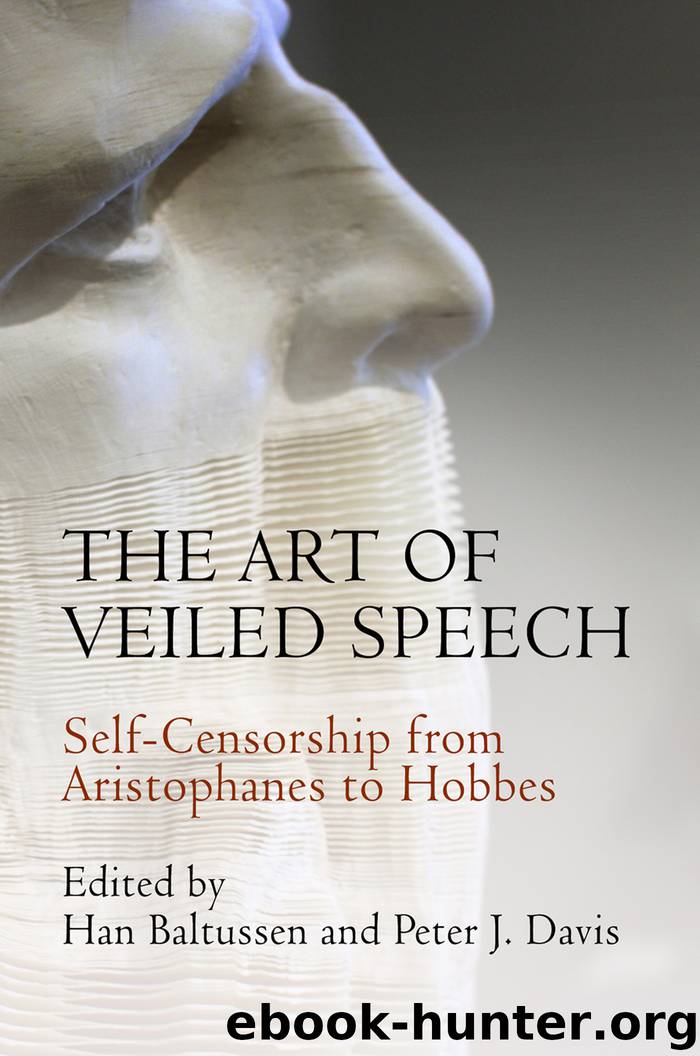The Art of Veiled Speech by Baltussen Han; Davis Peter J.;

Author:Baltussen, Han; Davis, Peter J.;
Language: eng
Format: epub
Publisher: University of Pennsylvania Press
Published: 2019-04-15T00:00:00+00:00
One of the most striking elements of this passage is Valerius’s use of the word patres, highlighted as it is by the alliteration of “p” sounds. Variously translated as “fathers” or “the lot” or “councilors,”8 patres is the precise technical term used to designate members of the Roman senate.9 As Wijsman notes, “the author provides the Colchians with a senate, just as Rome has one.”10 That this understanding of patres is correct, becomes even clearer when Valerius describes a procession of Colchians led by Absyrtus, the king’s son. After Aeetes’ heir come other members of the royal family, actual and potential, and then the “patres: quos praecipuo Titania tellus / legit honore patres” (“the patres whom the Titanian land has chosen for outstanding honor”; 5.463–64). Here it is important to note that legit (“has chosen”) is precisely the correct technical term for appointment to membership of the Roman senate,11 and that honor includes among its meanings “(high) public or political office.”12 And as Rome has a populus, so Colchis has a uulgus, a term commonly used to designate the Roman people at their most inconstant.13 Thus Colchis, equipped with senate and people, has an apparently republican constitution. But it also has a tyrannus (5.264), a tyrant who actually wields the power, a tyrant who treats the senate with contempt.
We find similar use of language in book 8. When Absyrtus arrives with his fleet, he claims the support of all the Colchians: “quin omnes alii pariter populique patresque / mecum adsunt” (“In fact, all the others, populi and patres alike, are here with me”; 8.281–82). Because Absyrtus claims popular support as a means of strengthening his claim, the people are no longer the uulgus, they are now populi.14 In fact, the language here recalls Virgil’s description of Augustus’s entry into battle with his fleet “cum patribus populoque” (“with the senators and people”; A. 8.679). Like the Virgilian Augustus, Absyrtus invokes the presence of the senators and people as justification for his actions.
But the Colchians are not the only people in the Argonautica with quasi-Roman constitutional arrangements. That Iolcus is organized in a similar fashion is made clear early in book 1 when Jason contemplates his response to Aeetes’ proposed expedition to retrieve the golden fleece:
Heu quid agat? populumne leuem ueterique tyranno
infensum atque olim miserantes Aesona patres
aduocet?
Ah, what is he to do? Should he summon the people, inconstant and hostile to the aged tyrant, and the senators who have long since pitied Aeson? (V. Fl. 1.71–73)
Download
This site does not store any files on its server. We only index and link to content provided by other sites. Please contact the content providers to delete copyright contents if any and email us, we'll remove relevant links or contents immediately.
| Ancient & Classical | Arthurian Romance |
| Beat Generation | Feminist |
| Gothic & Romantic | LGBT |
| Medieval | Modern |
| Modernism | Postmodernism |
| Renaissance | Shakespeare |
| Surrealism | Victorian |
4 3 2 1: A Novel by Paul Auster(12367)
The handmaid's tale by Margaret Atwood(7752)
Giovanni's Room by James Baldwin(7319)
Big Magic: Creative Living Beyond Fear by Elizabeth Gilbert(5753)
Asking the Right Questions: A Guide to Critical Thinking by M. Neil Browne & Stuart M. Keeley(5752)
Ego Is the Enemy by Ryan Holiday(5412)
The Body: A Guide for Occupants by Bill Bryson(5077)
On Writing A Memoir of the Craft by Stephen King(4925)
Ken Follett - World without end by Ken Follett(4720)
Adulting by Kelly Williams Brown(4564)
Bluets by Maggie Nelson(4544)
Eat That Frog! by Brian Tracy(4519)
Guilty Pleasures by Laurell K Hamilton(4437)
The Poetry of Pablo Neruda by Pablo Neruda(4090)
Alive: The Story of the Andes Survivors by Piers Paul Read(4017)
White Noise - A Novel by Don DeLillo(4001)
Fingerprints of the Gods by Graham Hancock(3986)
The Book of Joy by Dalai Lama(3970)
The Bookshop by Penelope Fitzgerald(3843)
